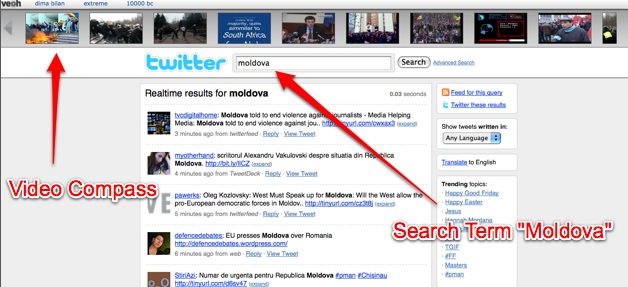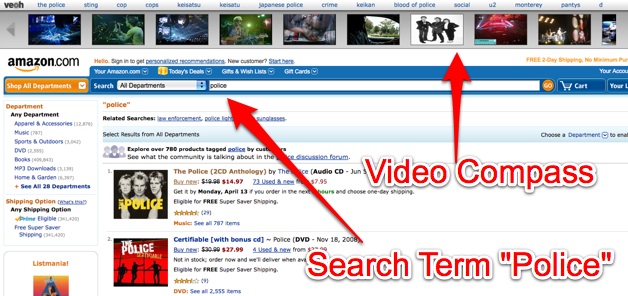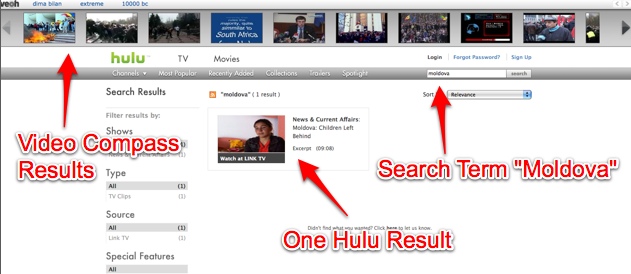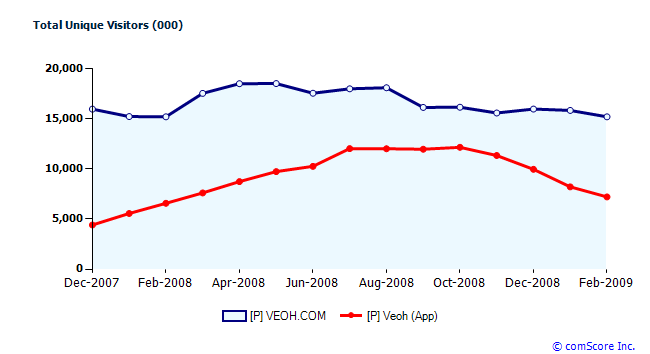
As video sites on the Web struggle to find a business model that will pay their mounting bandwidth and storage bills, many of them are trying to reinvent themselves. Veoh, which has raised a total of $70 million, had to cut 35 percent of its staff earlier this month and the site seems to be losing steam. Unique visitors are down 18 percent from their high a year ago to 15.2 million worldwide, and users of its desktop app VeohTV are down 40 percent to 7.2 million worldwide, according to comScore (see chart below).
Founder Dmitry Shapiro is now back as CEO and he is pouring the company’s remaining energy into a new product launched six weeks ago called Video Compass (read our review). Since launch, it has been downloaded 800,000 times, and is currently being downloaded at a rate of 25,000 a day. Video Compass may amount to a Hail Mary pass to try to save the company. It is an attempt to spread video search across the Web by bringing you search results when you don’t even know you are looking for videos.
The way it does this is through a browser add-on for Firefox and Internet Explorer that is triggered whenever you do a search on a growing list of sites, including Google, Yahoo, Amazon, Craigslist, Wikipedia, and even YouTube. In the past few days, it just added Twitter Search, MySpace, Hulu, DailyMotion, and Metacafe. Up next will be Flickr, Photobucket, and Facebook.
Whenever you do a regular search on these sites, a ribbon with Veoh video search results pops down triggered by the same keyword you are searching. For instance, if you are searching for “police” on Amazon, a bunch of Police music videos appear along the top ribbon, along with some car chase footage. You can cycle through the videos by clicking an arrow to see more results in the ribbon or you can click on related tags along the top (“Sting,” “crime,” “japanese police”) to refine your search.

If you click on any of the thumbnails, a semi-transparent player opens up and lets you watch it in-situ, without necessarily going to Veoh.com. When you are done, you close the window and you are back at where you left off.

I’ve been testing Video Compass for the past few days, and the video results pretty decent. I find them to be a bit redundant on other video sites such as YouTube, but they can sometimes offer better results on narrower video sites. For instance, try searching for “Moldova” on Hulu and you get one result, whereas the Veoh Video Compass bar turns up plenty of protest videos. And do a search on Twitter and it adds a whole different dimension to your search. Even searches on Google bring up more video results than occur naturally. And you can always turn it off if it starts to annoy you.

The big question is can Veoh create a business around a browser add-on? That all depends on how much of a habit people make of clicking on the Veoh video results and how good they are. Veoh has developed its own behavioral targeting technology which generates both video recommendations and helps target advertising. Shapiro tells me:
Today we are doing a pretty good job monetizing Veoh.com. We serve pre-rolls (at high CPMs), mid-rolls, overlays, and targeted display units. Our behavioral targeting engine lets us get higher CPMs than our competitors, while selling out more inventory. While I can’t share the exact numbers with you, I can tell you that our quarters are in the millions and every quarter has been a record quarter, although we are not cash flow positive yet.
With Video Compass, he can promote content from partners directly in the toolbar when people are conducting associated searches elsewhere on the Web. Movie trailers would be one obvious type of content to promote, but sponsored video ads of all stripes could be placed in both the results or during playback. There is also a lot of empty real estate around the player that can be filled with ads in the future. Finally, Shapiro is working on ways to drive users back to Veoh.com where the monetization model is more clear. So he is not giving up on his destination site entirely.
Relying on people to download his add-on, however, is a risky strategy. Not only does it require people to go out of their way, as more and more browser add-ons adopt similar triggering mechanisms, conflicts could emerge. For instance, Glue has a similar user interface, although it is not triggered by searches. But you can imagine a time when two different add-ons are both triggered and either one cancels out the other or the top of the browser becomes a mess. This is essentially the same problem people have with the new Diggbar and other Website framing mechanisms. They can create a lot of clutter instead of helping you cut through it.
